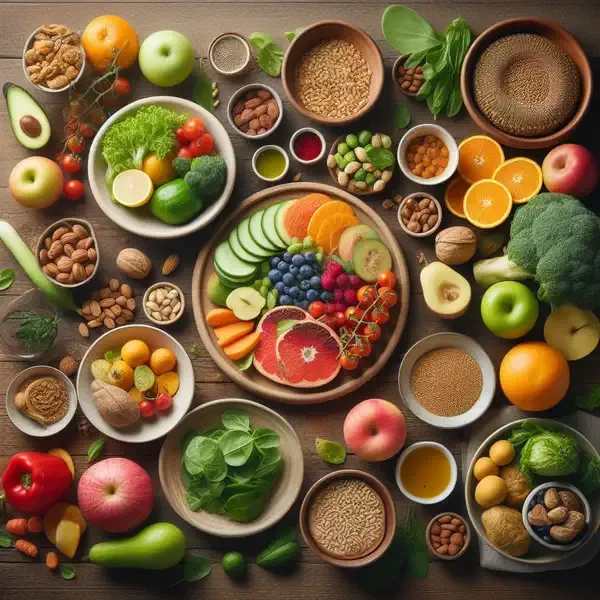
SAVING ORGANIC FOOD Preserving the Epoch of Organic Food: Surmounting Challenges and Embracing Triumphs
Preserving the Epoch of Organic Food: Surmounting Challenges and Embracing Triumphs
Embarking upon the modern era, the vital task of safeguarding the organic culinary realm looms larger than ever. In a domain where consumers increasingly prioritize well-being and ecological awareness, the resonance for organic produce experiences a gradual crescendo. A resounding call echoes to “conserve organic delicacies” amidst the encroachments of industrial agriculture, genetically engineered entities, and pernicious chemicals. Within these lines, we delve into the historical panorama, pivotal junctures, notable personalities, and the reverberations of the “conserve organic delicacies” movement. Additionally, we scrutinize the luminaries shaping organic food preservation while providing a nuanced analysis of both its positive and negative facets. Ultimately, we cast our gaze into the horizon, contemplating potential trajectories for the organic culinary universe.
The 20th-century metamorphosis of agriculture witnessed a paradigm shift towards expansive monoculture practices, reliant on chemical fertilizers, pesticides, and genetically modified organisms. While these methodologies elevated crop yields and slashed expenses, their toll on human health and the environment was palpable. Hence, the organic food movement emerged as a countermeasure, championing sustainable farming that fosters soil vitality, biodiversity, and innate pest management.
A watershed moment in the movement’s chronicles unfolded in 1962 with the release of Rachel Carson’s groundbreaking tome, “Silent Spring.” Carson’s exposé on pesticide perils galvanized an epoch of environmental advocates, catalyzing a demand for stringent regulations on chemical applications in agriculture. This epochal juncture laid the bedrock for the organic farming renaissance during the 1970s and 1980s, witnessed through the emergence of entities such as the Organic Trade Association and the Rodale Institute.
Another pivotal chapter materialized in 1990 with the inception of the Organic Foods Production Act, erecting national benchmarks for organic cultivation and labeling. This legislative milestone facilitated the ascent of the organic food industry in the United States, instigating heightened consumer awareness and a surge in demand for organic commodities.
Architects of the organic food saga, luminaries like J.I. Rodale, who birthed the Rodale Institute in 1947, championing organic farming tenets, and Alice Waters, a lauded culinary virtuoso and advocate for sustainable agriculture, etch indelible imprints on the movement. Their influentially resonant voices have sculpted the organic food narrative, amplifying awareness on the imperative to “conserve organic delicacies.”
The impact of the “conserve organic delicacies” movement reverberates profoundly, with consumers increasingly gravitating towards organic alternatives for their health dividends and ecological merits. Organic farming practices, proven to enhance soil fecundity, conserve water, and mitigate pollution, present a sustainable alternative to conventional agriculture. Furthermore, organic edibles, often endowed with heightened nutritional content and devoid of noxious chemicals, emerge as a judicious choice for discerning consumers.
Yet, amidst these merits, the organic food realm grapples with its tribulations — exorbitant organic certification costs, encroachment by industrial agriculture, and the looming specter of genetically engineered contaminations. These challenges underscore the necessity for unwavering advocacy and support for organic farming, essential for the enduring viability of the organic food domain.
In summation, the odyssey of the “conserve organic delicacies” movement constitutes a formidable stride towards championing sustainable farming practices and disseminating awareness on the virtues of organic food. Icons such as J.I. Rodale and Alice Waters stand as sentinels, guiding the organic food trajectory and accentuating the need to safeguard organic agriculture. While challenges persist, the momentum towards sustainable alimentary ecosystems burgeons, with consumers increasingly cognizant of the urgency to “conserve organic delicacies” for progenies yet unborn. As we cast our gaze forward, the imperative remains: Uphold organic farming principles, prioritize the well-being of our planet, and in doing so, safeguard our collective future.
Inquisitive Quandaries Regarding the Salvation of Organic Delicacies
- What signifies the importance of preserving organic food? Preserving organic food stands as an imperative to champion sustainable agricultural practices, conserve biodiversity, and shield human health and the environment from deleterious chemicals ubiquitous in conventional agriculture.
- What perils does organic food face? Organic food contends with threats from industrial agriculture, genetically modified organisms (GMOs), chemical pesticides, and fertilizers, jeopardizing soil health, diminishing biodiversity, and tainting food with hazardous residues.
- Who are influential figures in the organic food movement? Pivotal figures encompass J.I. Rodale, founder of the Rodale Institute, and Alice Waters, an esteemed chef and advocate for sustainable agriculture. Their impactful contributions have been instrumental in spotlighting the merits of organic food.
- How has legislation influenced the organic food sector? Legislation, exemplified by the Organic Foods Production Act of 1990, has instituted national benchmarks for organic cultivation and labeling. This regulatory framework has catalyzed the organic food industry’s growth, augmenting consumer awareness and demand.
- What advantages do organic farming practices confer? Organic farming practices bestow benefits by enhancing soil fertility, conserving water, and mitigating pollution. Organic produce, often enriched with nutrients and devoid of harmful chemicals, emerges as a healthier choice for consumers.
- What hurdles confront the organic food industry? Challenges include the onerous cost of organic certification, rivalry from industrial agriculture, and the specter of GMO contamination. Overcoming these hurdles mandates sustained advocacy and support for organic farming practices.
- How can consumers champion the organic food cause? Consumers play a pivotal role by choosing organic products, supporting local farmers markets, advocating for sustainable agricultural policies, and disseminating awareness about the merits of organic food within their communities.
- What lies on the horizon for organic food? The momentum towards sustainable food systems burgeons, with consumers increasingly cognizant of the imperative to “conserve organic delicacies” for future generations. Perpetual support for organic farming practices remains quintessential for a healthier planet and alimentary system.